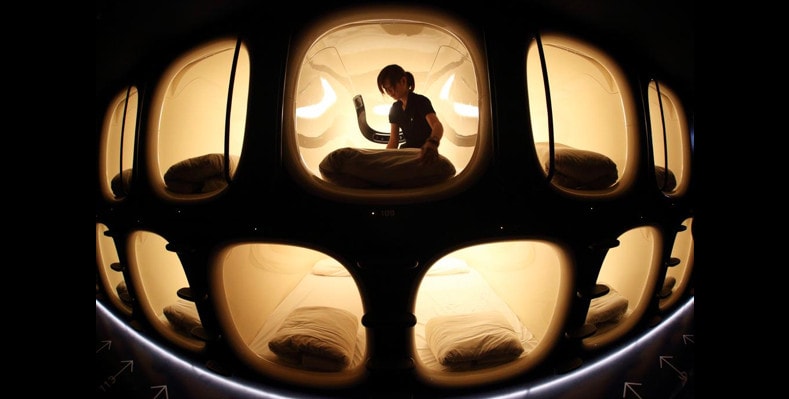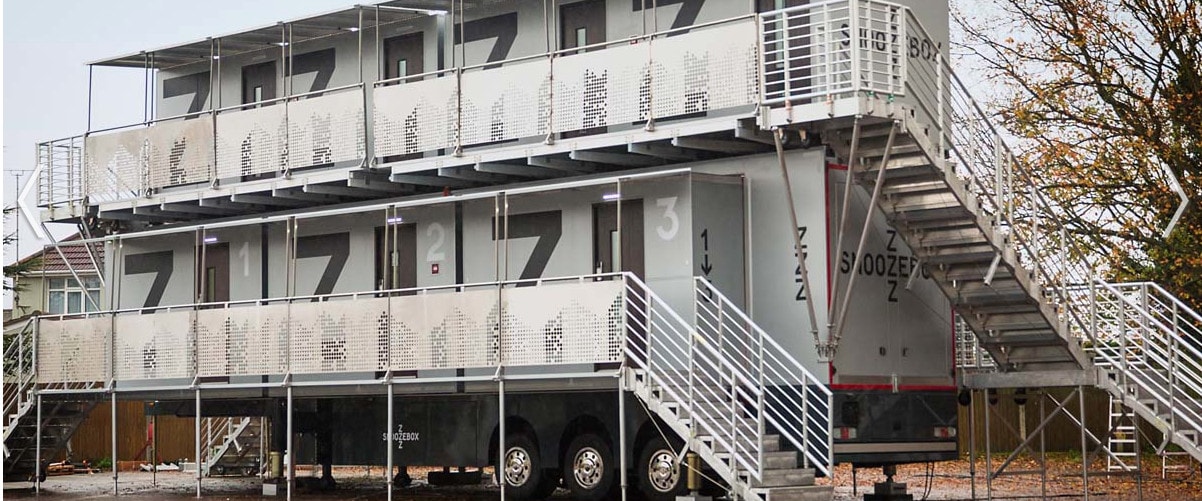Space Capsules: Design-Forward Airport Micro-Hotels
Share

Lean, Clean, and on the Scene
Now you can deal with canceled flights like a salaryman! ninehours has brought the ultra-minimalist capsule hotel format to Narita International Airport.
The Daily Mail breathlessly describes ninehours as “sci-fi”, though the capsule hotel format has been around for decades. The first capsule hotel opened in 1979, and the format has since become an enduring image of white-collar Japan’s skewed work-life balance. Work late and miss the last train. A cab across Tokyo costs around $90, while a berth in a capsule hotel costs roughly $40. So you queue up, pay, lock up your shoes, get a locker key, change into the loose trousers-robe-slipper uniform, enjoy hot showers, saunas, and screens showing worldwide stock-market performance. Maybe get something to eat, maybe get some work done in the office lounge.
As your eyelids droop, you can clamber into a plastic tube featuring a blanket and pillow, as well as a tiny television screen. These capsules line gender-separated wings in stacks of two. Pull on the roll-down blind at your feet and hope your neighbors don’t snore. The whole experience is efficient and clean. Don’t expect the communal arrangement to lead to conversations with strangers, though.
The capsule hotel lends itself marvelously to an airport, where flight cancelations throw travelers’ schedules into chaos. The train back into Tokyo takes ages and costs a fortune, so, hey, just stay at ninehours and enjoy a soothing-yet-surreal experience. Your travel misfortune becomes a last-minute feature: wait ’til your friends and family hear about this. Unlike pretty much everything else at NRT, ninehours is open 24 hours a day. You can stay from one hour to nine hours. Wake up refreshed, and you’re right where you need to be -hopefully your plane is, too.
Unlike workaday capsule hotels, ninehours allows guests with tattoos. By the way, there’s a restaurant at NRT that, once you buy your first beer, offers discounts for subsequent beers. This may or may not drive traffic to ninehours, where a stay starts at ï¿¥3900/$35. That’s twice as expensive as ninehours Kyoto. Welcome to the Greater Tokyo Area, gaijin.

- Snoozebox portable hotel. Image via Snoozebox
Hotel to Go
Snoozebox has unveiled a somewhat similar cluster of little places to sleep: an ultraportable hotel that can be plunked down pretty much anywhere. The sleek interiors were designed by Tangerine, and have crammed as many amenities as the cubic footage could tolerate. Each room in the configurable unit has an ensuite washroom, so you don’t have to worry about awkward eye contact.
Snoozebox’s tiny rooms are less tiny than the ninehours bunks, and offer closable and lockable doors. These mobile hospitality zones would be perfect for an airport parking lot; either ahead of busy periods such as Thanksgiving and Christmas, or as permanent fixtures. Let’s be honest, the orderly nature of a Japanese capsule hotel would be pretty hard to replicate at, say, JFK – something like Snoozebox might be more Westerner-friendly.


